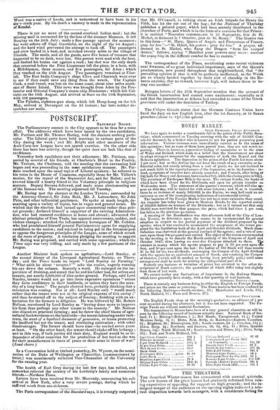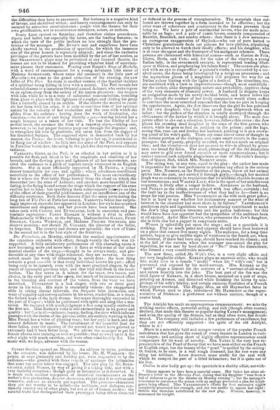THE THEATRES.
THE theatrical Winter season has commenced with unusual quietude. The new lessees of the great houses had prudently refrained from raising expectation or appealing for support on high grounds ; and the indulgent temper of the audiences on the opening nights indicated a tolerant disposition towards both managers, with a considerate feeling for
the difficulties they have to encounter. But leniency is a negative kind of favour, and shortlived withal ; and hearty encouragement can only be secured by attractive entertainments : people visit the theatre for their own gratification, not to countenance managers, actors, or authors.
Drury Lane opened on Saturday, and therefore claims precedence. Opera and ballet, but especially the latter, are the leading features ; to which the taste of the public inclines no less strongly than the pre
ference of the manager. Mr. BUNN'S tact and experience have been chiefly exerted in the production of spectacle, for which the immense size-of the great houses is especially adapted; and since the exclusive privileges of the patents have been modified by the act of last session, so that SHAKSPERE'S plays may be performed at any licensed theatre, the
lessees are not to be blamed for providing whatever kind of entertain
ment pleases their customers. Passing over BALFE'S Siege of Rochelle, with a word of encouragement for a young debutante (the sister of Madame ALBERTAZZI, whose name she assumes) in the little part of .Marcella—we come to the grand attraction of the evening, the new ballet of The Pen. Its story is another version of the familiar incident
of a spiritual being falling in love -with a mortal. The Pen i reveals her celestial charms to a luxurious Oriental named Achmet, who seeks repose in an opium-sleep from the satiety of his harem pleasures : she coquets with him while he is in a state of saltatorial somnambulism, bounding from place to place with the lightness of a zephyr, and eluding his grasp like a butterfly chased by an urchin. If she allows the mortal to encir cle her form with his arms, it is only to convince him of her spiritual
nature by the velocity of her evolutions and the ease with which she glides from his embrace : having done the work of fascination, she vanishes,—the door of exit being literally ajar,—leaving behind her a
magic bouquet as a token of her visit. To test the fidelity of her mortal lover, she assumes the form of a runaway slave,—taking care, however, to let her proper features peep out through the disguise ; and, to strengthen his love by gratitude, she saves him from the dagger of his discarded Sultana. The supposed slave is demanded back by her master, the Paeha ; the lover, refusing to give her up, is condemned to be flung out of window : he falls into the arms of the Pen, and appears in Paradise beside her, blooming in the pink fire that represents celestial radiance.
Caiu.orre GRIST, as the Pen, is as etherial in her action as it is possible for flesh and blood to be : the amplitude and elasticity of her bounds, and the flowing grace and lightness of all her movements, excited the audience to a pitch of rapture rarely witnessed in an English theatre. She is most efficiently supported by 31. PETIPA, a young dancer remarkable for ease and agility ; whose adroitness contributes materially to the effect of her performance. The most extraordinary feat is where the Pen fairly flings herself from the cloud on which she descended into the arms of Achmet ; and another, more beautiful if less daring, is the flying bound across the stage which the support of his arms enables her to take : but specifying these achievements conveys no idea of the effect of their graceful performance, and an insufficient one of the difficulty overcome. Both these dancers filled the same parts during the long run of The Pen i at Paris last season. C.aatorr.s Gams has surprisingly improved since she last appeared in London ; her style has acquired smoothness and elegance, and her powers have been matured. She takes rank with CERITO and DU3IILATRE, both in execution and pantomimic expression : FANNY ELSSLER is without a rival in either. Mademoiselle O'llaree, as the Sultana, Mademoiselles GALBY, PETIT STEPHAN, CLARA WensTER, and Madame PROCHE GIUBELEI, also deserve mention : nor should M. CORALLI, the director of the ballet, be forgotten. The scenery and dresses are splendid; the view of Cairo in the second act is in the best style of the GRIEVES.
Der Freischutz, on Monday, exhibited the musical appointments of the capacious orchestra with effect, though vocally the work was illsupported. A fully satisfactory performance of this charming opera is now becoming more and more rare : it fares as with some of the other musical classics of the stage,—thought to be always ready, and prodnceable at any time with slight rehearsal, they are never so. In concerted music the work of rehearsing is never done : the least thing towards a good ensemble is that every individual knows his part ; effect being only to be insured, even with the most practised singers, by the result of successful previous trial, and that trial still fresh in the recollection. The fine scena in A minor, for the tenor, two basses, and chorus, in the early part of the opera, lost much of its accustomed effect in the blending and contrast of the voices, from the want we have described. TEMPLETON is a bad singer, with two or three good notes in his voice. His style is essentially 'vicious: the exaggerated slide in taking distant intervals, the frequent false intonation, and -want of equality and correspondence in his notes, render him, as a tenor, the forlorn hope of the lyric drama. Grua:tines thoroughly succeeded in the part of Caspar; which he performed with spirit and sang like a musician. He replaced with muchjudgment a fine song usually omitted in the first act. Miss ROMER'S voice is still extraordinary in its power and quality: but that is all—delicacy, beauty, feeling, the taste which informs passages with the charm of the genuine artist, are entirely wanting in her. Miss POOLE has a voice of pleasing tone ; but her style is hard, and she seemed deficient in music. The curtailment of the beautiful duet for these ladies, near the opening of the second act, would have grieved us extremely had it been better sung. We advise the manager to get his female chorus into training as soon as possible ; they screwed up to A the other night with much exertion, and were often considerably flat. The music will, we hope, advance with the season.



























 Previous page
Previous page